|
|
|
Sort Order |
|
|
|
Items / Page
|
|
|
|
|
|
|
| Srl | Item |
| 1 |
ID:
166864
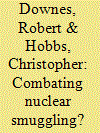

|
|
|
|
|
| Summary/Abstract |
International concern over nuclear terrorism has grown during the past few decades. This has driven a broad spectrum of efforts to strengthen nuclear security globally, including the widespread adoption of radiation-detection technology for border monitoring. Detection systems are now deployed at strategic locations for the purported purpose of detecting and deterring the smuggling of nuclear and radioactive materials. However, despite considerable investment in this area, few studies have examined how these programs are implemented or the operational challenges they face on a day-to-day basis. This article seeks to address this with a focus on radiation-detection efforts at maritime facilities. Utilizing practitioner interviews and a survey, this article identifies the factors that influence the planning and use of these systems in this fast-moving environment. The results clearly demonstrate that the implementation of these systems varies significantly across different national and organizational contexts, resulting in a fragmented global nuclear-detection architecture, which arguably undermines efforts to detect trafficked nuclear-threat materials. Greater consideration should therefore be given to developing international standards and guidance, designing and adopting tools to support key parts of the alarm assessment process, and broader sharing of good practice.
|
|
|
|
|
|
|
|
|
|
|
|
|
|
|
|
| 2 |
ID:
177822
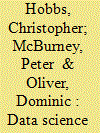

|
|
|
|
|
| Summary/Abstract |
Radiation detection technology is widely deployed to identify undeclared nuclear or radiological materials in transit. However, in certain environments the effective use of radiation detection systems is complicated by the presence of significant quantities of naturally occurring radioactive materials that trigger nuisance alarms which divert attention from valid investigations. The frequency of nuisance alarms sometimes results in the raising of alarming thresholds, reducing the likelihood that systems will detect the low levels of radioactivity produced by key threat materials such as shielded highly enriched uranium. This paper explores the potential of using data science techniques, such as dynamic time warping and agglomerative hierarchical clustering, to provide new insights into the cause of alarms within the maritime shipping environment. These methods are used to analyze the spatial radiation profiles generated by shipments of naturally occurring radioactive materials as they are passed through radiation portal monitors. Applied to a real-life dataset of alarming occupancies, the application of these techniques is shown to preferentially group and identify similar commodities. With further testing and development, the data-driven approach to alarm assessment presented in this paper could be used to characterize shipments of naturally occurring radioactive materials at the primary scanning stage, significantly reducing time spent resolving nuisance alarms.
|
|
|
|
|
|
|
|
|
|
|
|
|
|
|
|
| 3 |
ID:
191976


|
|
|
|
|
| Summary/Abstract |
Over the past two decades, the international community has devoted considerable attention to the human dimension of nuclear security. This trend is part of a more holistic approach to securing nuclear facilities, grounded in the concept of culture, that moves beyond the traditional focus of physical-protection measures. But what explains this shift and what does it entail? This article begins by demonstrating, through a series of real-life case studies, the potential for human factors to undermine nuclear-security systems. It then considers the rise and consolidation of “culture” as a concept used to better understand and organize international efforts to strengthen nuclear security. Nuclear-security culture is then explored in practice, drawing on a review of relevant initiatives as well as empirical research conducted by the authors at several UK nuclear sites. A number of likely challenges for developing an effective nuclear-security culture at the operational level are discussed, as is the value of the culture-focused guidance developed by the International Atomic Energy Agency. The article concludes that while nuclear-security culture has been widely promoted at the international level, there exists considerable scope for new initiatives to further strengthen engagement at the working level of industry.
|
|
|
|
|
|
|
|
|
|
|
|
|
|
|
|
| 4 |
ID:
164197


|
|
|
|
|
| Summary/Abstract |
In the age of ‘Big Data’, the potential value of open-source information for intelligence-related purposes is widely recognised. Of late, progress in this space has increasingly become associated with software that can expand our ability to gather, filter, interrelate and manipulate data through automated processes. The trend towards automation is both innovative and necessary. However, techno-centric efforts to replace human analysts with finely crafted algorithms across the board, from collection to synthesis and analysis of information, risk limiting the potential of OSINT rather than increasing its scope and impact. Effective OSINT systems must be carefully designed to facilitate complementarity, exploit the strengths, and mitigate the weaknesses of both human analysts and software solutions, obtaining the best contribution from both. Drawing on insights from the field of cognitive engineering, this article considers at a conceptual level how this might be achieved.
|
|
|
|
|
|
|
|
|
|
|
|
|
|
|
|
| 5 |
ID:
114687


|
|
|
|
|
| Publication |
2012.
|
| Summary/Abstract |
In February 2012, Iran announced its willingness to resume negotiations with the Western powers. This statement followed in the wake of a damning report by the International Atomic Energy Agency (IAEA) Board of Governors and the imposition of additional sanctions by the international community on an Iranian economy already under pressure. Tehran's announcement also coincided with increased speculation regarding an Israeli military strike on Iranian nuclear facilities. At the same time, however, this seemingly positive step appeared to be undermined by Iran's concomitant announcement that "huge" technical progress has been made on Iran's nuclear programme. This article will explore the significance of the recent political, diplomatic and technical developments in the Iranian nuclear affair and situate them in the broader context of Tehran's nuclear strategy. The analysis will assess the potential for this latest phase in the Iranian nuclear crisis to reverse Iran's current trajectory and initiate a rapprochement between Iran and Western powers.
|
|
|
|
|
|
|
|
|
|
|
|
|
|
|
|
| 6 |
ID:
117713


|
|
|
|
|
| Publication |
2012.
|
| Summary/Abstract |
The past year has seen a steady rise in tensions with regard to Iran's nuclear programme. Iran's economy is being crippled by far-ranging sanctions and the threat of an Israeli attack on Iranian nuclear facilities looms large on the horizon. Yet the country's nuclear programme marches on, stoking fears that Iran may indeed be seeking to cross the nuclear weapons threshold. In this context, it is timely to consider how key regional players would respond to a nuclear-armed Iran. Many argue that an Iranian bomb would prompt a proliferation cascade in the Middle East. However, a closer examination of the drivers for key regional players shows that this is not necessarily the case. There is a range of non-proliferation tools that could be applied by the West and others to offset this risk.
|
|
|
|
|
|
|
|
|
|
|
|
|
|
|
|
| 7 |
ID:
111917
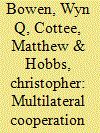

|
|
|
|
|
| Publication |
2012.
|
| Summary/Abstract |
The second Nuclear Security Summit on 26-27 March 2012 in Seoul provides an important opportunity to gauge international consensus on the threat posed by nuclear terrorism, and to evaluate progress in the development of multilateral cooperative efforts to prevent it. However, the 'nuclear security' agenda has long been complicated by the complexity of the issues it covers and diverging perceptions of the risks and threats in this area. Further complications involve the politics that have constrained the development of formal cooperative approaches and the patchwork nature of the existing multilateral policy architecture. While the Summit is unlikely to go very far in mitigating these complications, it will nonetheless provide impetus to multilateral efforts to strengthen the international regulative framework in this area and, in the process, to develop the norm of nuclear security. Beyond Seoul several priorities stand out. Nuclear safety and nuclear security need to be approached in a more balanced way by the International Atomic Energy Agency, and it must also be allowed to adopt a more joined-up, and less stove-piped, approach to nuclear governance across the safeguards, safety and security fields. Developing countries that are concerned by growing demands for strengthened nuclear security arrangements need greater reassurance from those proposing them that these will not undermine their rights under the Nuclear Non-Proliferation Treaty to pursue civil applications of nuclear energy. Greater progress also needs to be made in universalizing the key nuclear security conventions and their amendments, and attention should be given to how momentum and high-level political buy-in to the nuclear security agenda can be maintained in the future both as part of, and beyond, the Nuclear Security Summit process.
|
|
|
|
|
|
|
|
|
|
|
|
|
|
|
|
| 8 |
ID:
153504
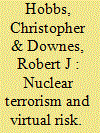

|
|
|
|
|
| Summary/Abstract |
Assessing the risk of nuclear terrorism is a challenging task due to the diversity of actors involved, variety of pathways to success, range of defensive measures employed, and the lack of detailed historical record upon which to base analysis. Numerical models developed to date vary wildly in both approach and ultimate assessment: estimates of the likelihood a nuclear terrorist attack differ by up to nine orders of magnitude. This article critiques existing efforts from the standpoint of probability theory, and proposes an alternative perspective on the utility of risk assessment in this area. Nuclear terrorism is argued to be a ‘virtual risk’ for which it is not possible to meaningfully ascribe a quantitative measure, making numerical estimates of the likelihood of nuclear terrorism misleading. Instead, we argue that focus should be placed on utilising models to identify areas of disagreement as targets for further research, with greater emphasis on understanding terrorist decision-making and adaption in response to nuclear security measures.
|
|
|
|
|
|
|
|
|
|
|
|
|
|
|
|
| 9 |
ID:
180506


|
|
|
|
|
| Summary/Abstract |
The coronavirus pandemic has had a significant impact on the nuclear industry, complicating operations and altering the delivery of both safety and security. This has generated concerns over the ability of governments and industry to provide vital services, while also protecting against changing threats that have evolved to take advantage of the pandemic. Christopher Hobbs, Nickolas Roth and Daniel Salisbury examine the nuclear security community’s response to this challenge, exploring how the risk landscape has been changed by the pandemic and the efficacy of new security solutions.
|
|
|
|
|
|
|
|
|
|
|
|
|
|
|
|
| 10 |
ID:
129730
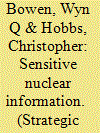

|
|
|
|
|
| Publication |
2014.
|
| Summary/Abstract |
This article starts by discussing sensitive nuclear information and how malicious non-state actors could exploit this to facilitate acts of nuclear terror. Our analysis shows that there is a significant information security challenge in this area due to the diversity of sensitive information, the different communities within which it resides and the range of mechanisms by which it could be transferred. We then turn our attention to assessing different steps that could be taken to protect sensitive nuclear information. Here there are limits to the effectiveness of international instruments and national laws and consequently bottom-up initiatives designed to promote responsible self-governance should be developed and supported.
|
|
|
|
|
|
|
|
|
|
|
|
|
|
|
|
|
|
|
|
|